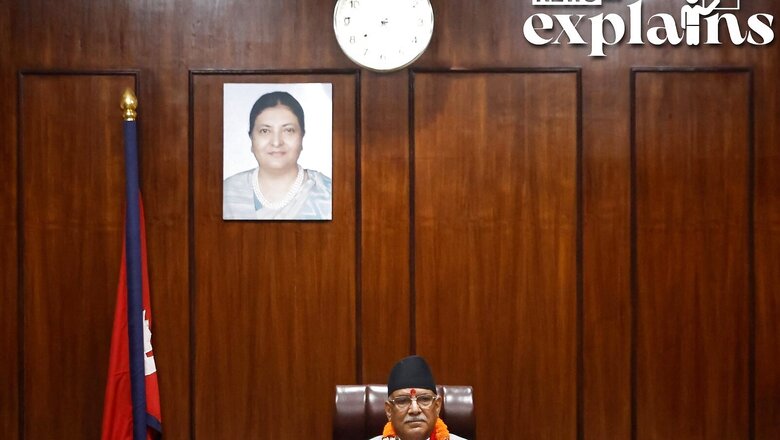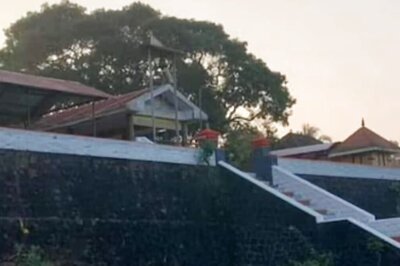
views
Rabi Lamichhane, a former TV anchor whose newly-launched party won a surprisingly huge mandate in the November 20 elections, on Monday joined Nepal’s new government led by former Maoist rebel chief Pushpa Kamal Dahal ‘Prachanda’ as the Deputy Prime Minister and Home Minister.
Lamichhane’s Rastriya Swatantra Party (RSP), which was formed just months ago, won 20 seats in the 275-member House of Representatives and is the third largest party among the ruling alliance.
Speaking to the media after the meeting of the ruling coalition at the Parliament building in Naya Baneshwor on Monday, he said that he decided to join the new government after a common agreement was made among the ruling alliance members to form a mechanism empowered to investigate corruption issues.
He said that all the ruling parties have agreed on this matter. Lamichhane joined the office at Singh Durbar shortly after taking the oath of office and secrecy at the President’s Office, Sheetal Niwas.
Lamichhane also said that there was a common commitment to the bill of education and health among the ruling alliance members. He also told the media about a common consensus among the ruling parties on giving the right to vote to Nepali citizens living abroad.
How Will Prachanda’s Rise Affect India?
India will have to carefully monitor the developments in Nepal and focus on taking forward the overall ties, foreign policy experts said on Monday amid concerns over possibility of China gaining upper hand in Kathmandu under the country’s new government led by former Maoist leader Pushpa Kamal Dahal ‘Prachanda’.
Former Nepalese Foreign Minister Ramesh Nath Pandey stated that the current situation is not encouraging for India-Nepal relations, claiming that the “current leaders” have created irritants in the past.
“Past records of present leaders are not encouraging. They created new irritants in the relationship and instead of getting away with unwanted baggage, they added more irritants,” he told PTI over phone from Kathmandu.
A Pro-China Stance But Understands Importance of India
CPN-UML leader Oli is widely regarded as a pro-China leader, and ties between India and Nepal were tested during his tenure as prime minister, which lasted from February 2018 to July 2021.
“It is certainly an unexpected development as the Nepali Congress-led five-party coalition could not arrive at a consensus on who would be the prime minister first,” Ranjit Rae, India’s former ambassador to Nepal and author of ‘Kathmandu Dilemma, Resetting India Nepal Ties’ told PTI.
“India will have to monitor the developments carefully as China has been trying to unite various factions of Communist parties in the region. We have to keep an eye on it,” he told PTI.
Rae, who served as India’s envoy in Kathmandu from September 2013 to February 2017, said Prachanda understands the significance of India-Nepal ties.
“At the same time, I’d like to point out that we worked with Prachanda during his previous two terms as Prime Minister. He visited India recently at the invitation of BJP President J P Nadda. He understands the significance of India-Nepal relations,” he said.
“As a result, we must continue to focus on strengthening overall ties, including in areas such as energy security and connectivity. We have made tremendous progress in improving cooperation in energy security and trade, and I anticipate that it will continue to grow,” Rae stated.
The former ambassador, who played a key role in enhancing India-Nepal ties during his stint in Nepal, said, “There has been a huge political churn going on in Nepal and new urban-oriented youthful political forces are coming up. We must reach out to them.” “Though the ties came under some tension under Oli’s prime ministership (border row), both sides came together to defuse it,” he said.
On Nepal’s trade ties with China, Rae said Kathmandu is aware of the situation faced by Sri Lanka on borrowings from Neijing for the BRI projects. “Let’s see how the new government approaches this,” he said.
The Dragon Lurks
China has been working hard to increase its influence in Nepal.
Nepal is important for India in terms of its overall strategic interests in the region, and the two countries’ leaders have frequently referred to the age-old “Roti Beti” relationship.
The country has a 1,850-kilometer border with five Indian states: Sikkim, West Bengal, Bihar, Uttar Pradesh, and Uttarakhand.
Land-locked Nepal is heavily reliant on India for goods and services transportation.
Nepal has access to the sea through India, and it imports the majority of its needs from and through India.
The India-Nepal Treaty of Peace and Friendship of 1950 is the foundation of the two countries’ special relations.
During his July visit to India, Prachanda stated that India and Nepal should address some of the issues “left by history” diplomatically in order to realise the full potential of bilateral cooperation.
He emphasised the importance of resolving issues related to the 1950 India-Nepal friendship treaty, the boundary dispute, and the EPG (Eminent Persons Group) report.
The EPG was formed a few years ago to investigate various aspects of India-Nepal relations, including the 1950 friendship treaty between the two countries. Nepal has demanded that the treaty be reviewed.
Ties between the two countries deteriorated significantly after Kathmandu published a new political map in 2020 that included the three Indian territories of Limpiyadhura, Kalapani, and Lipulekh as part of Nepal.
India reacted angrily, calling it a “unilateral act” and warning Kathmandu that such “artificial enlargement” of territorial claims would not be tolerated.
With inputs from PTI
Read all the Latest Explainers here


















Comments
0 comment